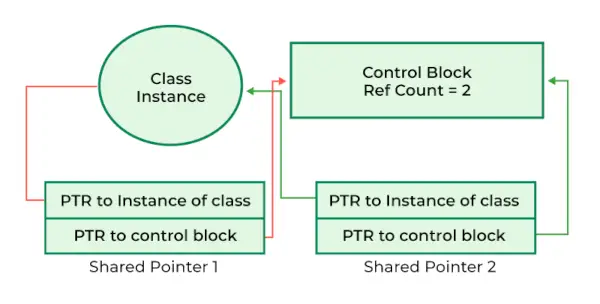std::shared_ptr è uno dei puntatori intelligenti introdotti in C++11. A differenza di un semplice puntatore, ha un blocco di controllo associato che tiene traccia del conteggio dei riferimenti per l'oggetto gestito. Questo conteggio dei riferimenti è condiviso tra tutte le copie delle istanze shared_ptr che puntano allo stesso oggetto, garantendo la corretta gestione ed eliminazione della memoria.
Prerequisiti: Puntatori in C++ , Puntatori intelligenti in C++ .

Puntatore condiviso in C++
Sintassi di std::shared_ptr
Il shared_ptr di tipo T può essere dichiarato come:
std::shared_ptr ptr_name;>
Inizializzazione degli oggetti shared_ptr
Possiamo inizializzare shared_ptr utilizzando i seguenti metodi:
1. Inizializzazione utilizzando un nuovo puntatore
shared_ptr ptr (new T()); shared_ptr ptr = make_shared (new T());>
2. Inizializzazione utilizzando il puntatore esistente
shared_ptr ptr(already_existing_pointer); shared_ptr ptr = make_shared(already_existing_pointer);>
Metodi membro di shared_ptr
Di seguito sono riportati alcuni membri associati a shared_ptr:
| Metodo | Descrizione |
|---|---|
| Ripristina() | Reimposta std::shared_ptr su vuoto, rilasciando la proprietà dell'oggetto gestito. |
| use_count() | Restituisce il conteggio dei riferimenti corrente, indicando quante istanze std::shared_ptr condividono la proprietà. |
| unico() | Controlla se c'è un solo std::shared_ptr che possiede l'oggetto (il conteggio dei riferimenti è 1). |
| Ottenere() | Restituisce un puntatore non elaborato all'oggetto gestito. Sii cauto quando usi questo metodo. |
| scambia(shr_ptr2) | scambia il contenuto (proprietà) di due istanze std::shared_ptr. |
Esempi di std::shared_ptr
Esempio 1:
C++
>
>Produzione
0x1365c20 A::show() A::show() 0x1365c20 0x1365c20 2 2 0 1 0x1365c20>
Esempio 2:
C++
// C++ program to illustrate the use of make_shared> #include> #include> using> namespace> std;> int> main()> {> >// Creating shared pointers using std::make_shared> >shared_ptr<>int>>shr_ptr1 = make_shared<>int>>(42);> >shared_ptr<>int>>shr_ptr2 = make_shared<>int>>(24);> >// Accessing the values using the dereference operator> >// (*)> >cout << 'Value 1: ' << *shr_ptr1 << endl;> >cout << 'Value 2: ' << *shr_ptr2 << endl;> >// Using the assignment operator (=) to share ownership> >shared_ptr<>int>>shr_ptr3 = shr_ptr1;> >// Checking if shared pointer 1 and shared pointer 3> >// point to the same object> >if> (shr_ptr1 == shr_ptr3) {> >cout << 'shared pointer 1 and shared pointer 3 '> >'point to the same object.'> ><< endl;> >}> >// Swapping the contents of shared pointer 2 and shared> >// pointer 3> >shr_ptr2.swap(shr_ptr3);> >// Checking the values after the swap> >cout << 'Value 2 (after swap): ' << *shr_ptr2 << endl;> >cout << 'Value 3 (after swap): ' << *shr_ptr3 << endl;> >// Using logical operators to check if shared pointers> >// are valid> >if> (shr_ptr1 && shr_ptr2) {> >cout << 'Both shared pointer 1 and shared pointer '> >'2 are valid.'> ><< endl;> >}> >// Resetting a shared pointer> >shr_ptr1.reset();> }> |
>
>Produzione
Value 1: 42 Value 2: 24 shared pointer 1 and shared pointer 3 point to the same object. Value 2 (after swap): 42 Value 3 (after swap): 24 Both shared pointer 1 and shared pointer 2 are valid.>
Esempio 3: implementazione di un elenco collegato utilizzando std::shared_ptr
C++
#include> #include> using> namespace> std;> // Define a singly linked list node> struct> Node {> >int> data;> >shared_ptr next;> >Node(>int> val)> >: data(val)> >, next(NULL)> >{> >}> };> class> LinkedList {> public>:> >LinkedList()> >: head(NULL)> >{> >}> >// Insert a new node at the end of the linked list> >void> insert(>int> val)> >{> >shared_ptr newNode = make_shared(val);> >if> (!head) {> >head = newNode;> >}> >else> {> >shared_ptr current = head;> >while> (current->successivo) {> >current = current->successivo;> >}> >current->next = nuovoNodo;> >}> >}> >// Delete a node with a given value from the linked list> >void> del(>int> val)> >{> >if> (!head) {> >return>;> >}> >if> (head->dati == val) {> >head = head->successivo;> >return>;> >}> >shared_ptr current = head;> >while> (current->successivo> >&& current->successivo->dati != val) {> >current = current->successivo;> >}> >if> (current->successivo && corrente->successivo->data == val) {> >current->successivo = corrente->successivo->successivo;> >}> >}> >// Traverse and print the linked list> >void> Print()> >{> >shared_ptr current = head;> >while> (current) {> >cout current = current->Prossimo; } cout<< 'NULL' << endl; } private: shared_ptr head; }; int main() { LinkedList linkedList; // Insert nodes into the linked list linkedList.insert(1); linkedList.insert(2); linkedList.insert(3); // Print the linked list cout << 'Linked List: '; linkedList.Print(); // Delete a node and print the updated linked list linkedList.del(2); cout << 'Linked List after deleting 2: '; linkedList.Print(); return 0; }> |
>
parola chiave statica in Java
>Produzione
Linked List: 1 ->2 -> 3 -> Elenco collegato NULL dopo l'eliminazione 2: 1 -> 3 -> NULL>
